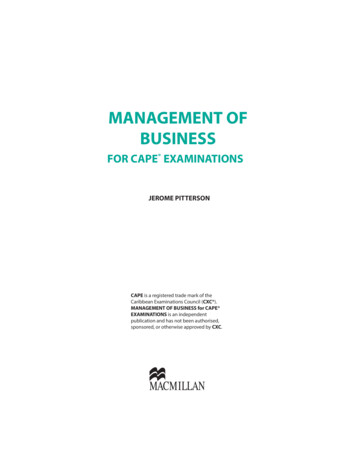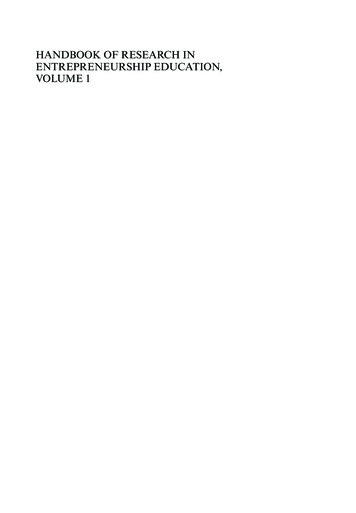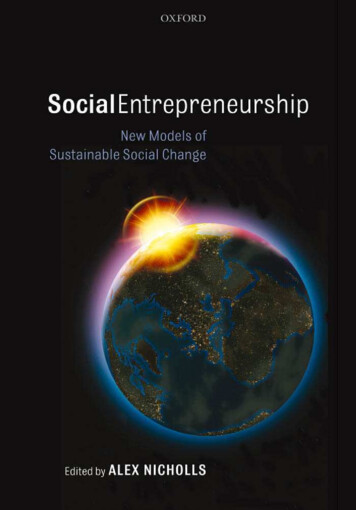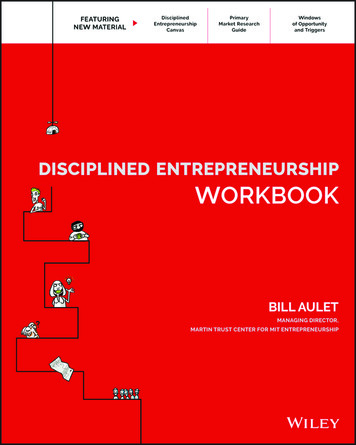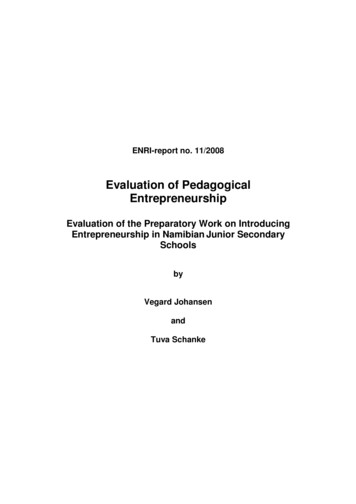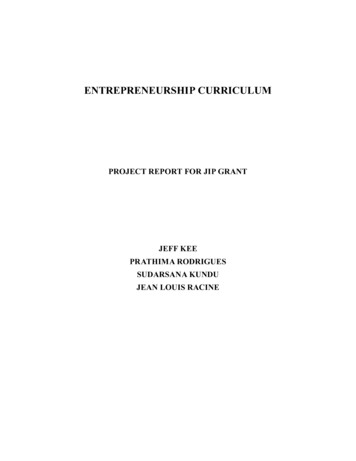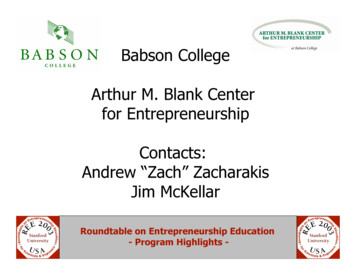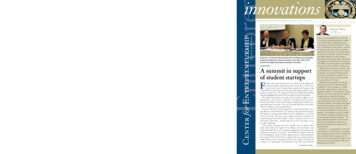
Transcription
CENTER FOR ENTREPRENEURSHIP/Spring 2012innovationsThursday, April 19Summit for Supporting Student Startups:Entrepreneurship faculty, staff, and studentsfrom more than a dozen colleges anduniversities discuss best practices andchallenges in educating aspiring studententrepreneurs and advancing studententerprises; Sheraton Syracuse UniversityHotel; By invitation onlyRochester Regional Business Plan ContestFinals and the 4th Annual Celebrationof Entrepreneurship Luncheon:9 a.m. – 1:30 p.m.; Hyatt Regency, 125 E.Main St., Rochester; Online registration andfee for luncheon required at htr.orgThursday, April 5CEIS University Technology Showcase:The annual CEIS University TechnologyShowcase provides a meeting placefor industry and universities to shareinformation, identify new technicalopportunities and needs, and form newpartnerships; 1– 6 p.m.; Doubletree Hotel,1111 Jefferson Rd., Rochester; Free andopen to the public; Register online at eurship Networking Night*: Thisevent will bring together undergraduates,graduate students, faculty, alumni, and localentrepreneurs to provide an opportunity fornetworking and socializing; Refreshmentsprovided; Sponsored by the undergraduateUR Entrepreneurs Club; 6:30 –8:30 p.m.;Schlegel Hall, Eisenberg Rotunda; RSVP tosvirgili@u.rochester.eduThursday, April 12F.I.R.E. Lecture Series*: “Positive andNegative Data in Patent Procurement—When to Provide It and Why It Matters”;Tina McKeon, founding partner ofMcKeon Meunier Intellectual Property Lawin Atlanta, Ga.; 9 –10 a.m.; Class of ‘62Auditorium (G-9425 & 1-9425), MedicalCenter; RSVP to (585) 784.8856 or emaildavid englert@urmc.rochester.eduWednesday, April 18Mark Ain Business Model CompetitionEntries Due: 4 p.m.; Submit electroniccopy to maureen.konopka@rochester.eduCenter for Entrepreneurship LectureSeries*: Nick Lantuh, president and director,NetWitness Corporation; 4:40–5:45 p.m.;Gleason 318/418; Reception to follow inSchlegel Hall, Eisenberg Rotunda; Freeand open to the public; Register online atsimon.rochester.edu/alumnieventsChange Service RequestedSaturday, April 21–Sunday, April 225th Annual ArtAwake*: Art and musicfestival in an urban space, founded bya KEY student group; 2 p.m.–12 a.m.;Rohrbach Brewing Co., 97 Railroad St.,Rochester; Learn more at artawake.orgMonday, April 23Charles and Janet Forbes EntrepreneurialCompetition Entries Due: 5 p.m.; Submitelectronic copy to maureen.konopka@rochester.edu; Open to Hajim Schoolundergraduate students onlyFriday, April 27–Sunday, April 29Inaugural Rochester Startup Weekend:Startup Weekend is an intense 54-hourevent that focuses on forming the basisof a credible business over the course of aweekend; Eastman Business Park, 200 W.Ridge Rd., Rochester; Registration requiredonline at rochester.startupweekend.org; Cost is 99 or 49 for studentsusing promotional code “STUDENT”(first 20 students will receive 25 towardthe registration fee by contacting cfe@rochester.edu)Thursday, May 3Mark Ain Business Model CompetitionSemi-Final Presentations: 4–6 p.m.;Schlegel 107; Free and open to the public;RSVP to (585) 276-3500 or register onlineFriday, May 4Charles and Janet Forbes EntrepreneurialCompetition Presentations andJudging*: 1–4 p.m.; Schlegel 207; Free andopen to the public; RSVP to (585) 276-3500or register onlineWednesday, May 16Mark Ain Business Model CompetitionFinalists’ Presentations and Judging:4–5:45 p.m.; Schlegel Hall, EisenbergRotunda; Free and open to the public; RSVPto (585) 276-3500 or register online* Check www.rochester.edu/entrepreneurship/events for the latest information.5www.rochester.edu/entrepreneurship VOLUME 4, ISSUE 2 Spring ng Entrepreneurs Academy grads: where are they now?Not knowing much about business or“I was exposed to different bigentrepreneurship, Eric Meyer ’12 (BA)business leaders in the Rochesterwas 15 when he saw a newspaper adcommunity,” said Lantuh. “They werein the Democrat and Chronicle for areally inspiring and displayed a lot ofprogram called the Young Entrepredrive and confidence, which reallyneurs Academy (YEA!) at the Universityignited the business spirit within me.”of Rochester. YEA!, founded in 2004Lantuh, a senior at Rochesterwith support from the Kauffman Founmajoring in psychology with a minordation, is a ground-breaking programin music, was accepted into the Guarthat guides middle and high school stuanteed Rochester Accelerated Degreedents through the process of launchingin Education BA/BS MS program fora real business over the course of aneducational policy and reform at theacademic year.Warner Graduate School of EducationWith a passion for film, Meyerand Human Development.started Spotlight Video Productions, a“YEA! taught me that I can combine my love for business with myfull-service production company thatpassion for education. I’m findingspecializes in weddings, corporateTop left: Eric Meyer ’12 (BA) at the YEA! Trade Show in the Mayout that I can do both and that theypromotional materials, and resort andRoom, Wilson Commons; below: Meyer today. Top right: Kathryncomplement each other,” she said.travel videos, while enrolled in YEA!.Lantuh ’12 (BA), ’13W (MS) filing DBAs at the Monroe CountyLantuh is also the captain of theThrough a projects-based curriculum,Clerk with fellow YEA! classmates; below: Lantuh today.women’s crew team and is in her secMeyer learned how to write a conciseond year as a Resident Advisor. Sheand formal business plan, pitch his ideahas worked at the Mount Hope Family Center forto investors, and market his company at a tradefor YEA!, overseeing the program’s joint venturesthree years and tutored first-graders at Rochestershow. Shortly after graduating from the acadand partnership with the U.S. Chamber of ComCity School No. 36.emy, Meyer launched a second business, Youngmerce, publicizing the program among teachers“We couldn’t be more proud of what ourScholar Adventures LLC, that organizes, launches,and parents, and establishing new sites.YEA! graduates are achieving,” said Gayle Jagel,and manages youth academic day camps.Kathryn Lantuh ’12 (BA), ’13W (MS) was afounder and CEO of YEA!. “Eric and Katie areAfter visiting River Campus for his YEA! classjunior in high school when she was accepted intoshining examples of how the academy helps stueach week, Rochester was Meyer’s top choice forthe YEA! program at Rochester. She was motidents realize their full potential. I couldn’t imaghis college career. He enrolled on a scholarshipvated by the idea of starting a real business andine a better spot for them than at the Universityfrom the McKelvey Foundation for Entrepreneurinteracting with local companies and clients.ial Spirit. Currently a senior majoring in politicalAs a YEA! student, Lantuh and her sister, Chris- of Rochester, and it comes as no surprise thatthey both have excelled on campus and beyond.”science, he has been involved in the 2012 Classtina, cofounded the company Beadnik, whichToday YEA! has served more than 600 studentsCouncil, UR Entrepreneurs Club, and Collegesold do-it-yourself beading kits and pre-madein nine states across the country. Learn moreRepublicans. In addition to his academic loadjewelry and taught jewelry-making classes forabout the program at yeausa.org.and extracurricular activities, Meyer is workingbirthday parties and other special occasions.CENTER FOR ENTREPRENEURSHIP/Spring 20126www.rochester.edu/entrepreneurshipDuncan T. MooreVice Provostfor EntrepreneurshipPhoto by Maureen KonopkaThursday, March 29–Friday March 30Center for Entrepreneurship1-211 Carol Simon HallP.O. Box 270360Rochester, NY 14627-0360EntrepreSign up to receive event notifications via email at www.rochester.edu/entrepreneurship/signup. Register for select events online at iversity of RochesterEntrepreneurship Events for Spring 2012Center for EntrepreneurshipContinued from Page 1wealth, and take their place as future business,community, and philanthropic leaders.”The two-day summit provided a uniqueopportunity for the participating universitiesto share and discover how other schools aresupporting, guiding, and preparing their students who are interested in creating businesses. Organizers reiterated the many benefitsof sustaining student startups—they provideexciting experiential curriculum for students,economic development in the community,and a reason for graduates to stay in the area.Bruce Kingma, associate provost for entrepreneurship and innovation at Syracuse University, required attending faculty and centerdirectors to nominate student entrepreneursto join the conference. He requested these students develop a “wish list” of courses and programs that they believe would increase theirchances for success. He also asked students topoint out areas that need improvement.Scott Zorn ’12 (BA), president of the student-run UR Consulting Group, represented Rochester on the summit’s student panel.Presenting alongside students from ClarksonUniversity, Rensselaer Polytechnic Institute,Rochester Institute of Technology, and Syracuse, he discussed the challenges of completing pro-bono project-based work for suchorganizations as Hayes Asset Management,AHEAD Energy, and Gilda’s Club of Rochester. He believes the support of faculty andlocal mentors is vital in creating feasible solutions for his clients.Other topics focused on different modelsof incubation, legal structures supporting student businesses, and funding sources. DuncanMoore, vice provost for entrepreneurship andthe Rudolf and Hilda Kingslake Professor ofOptical Engineering at Rochester, spoke onmodels of education, including the University’s new student incubator space at High TechRochester, the technical entrepreneurship andmanagement master’s degree, and the Kauffman Entrepreneurial Year program.Susanna Virgilio ’12 (BA), president of theUR Entrepreneurs Club and an entrepreneurship major, enjoyed learning about other colleges’ program offerings. She also networkedwith like-minded students from Syracuse,Cornell University, and the State Universityof New York at Albany.Keefe agrees that this was a primary objective of the event. “Hopefully, out of the summit will come further collaborations withmore people—not only at the faculty and administrative level—but among students.”CalendarTop Photos courtesy oF YEA!; Bottom Left: Eric M. Meyer; Bottom Right: Kathryn LantuhStartup summitScott Zorn ’12 (center) discussed the UR Consulting Group alongsidestudent entrepreneurs from universities across New York at theSummit for Supporting Student Startups in Syracuse.Cover StoryA summit in supportof student startupsFaculty, staff, and students from more than a dozen colleges andentrepreneurship organizations from across New York, Canada, and as far away as Osaka, Japan, gathered in Syracuse at theend of March to discuss best practices in giving aspiring student entrepreneurs a head start. The inaugural Summit for Supporting StudentStartups highlighted the good, bad, and ugly of student incubation.“By supporting students in starting ventures while in college, we arestaying true to our mission as educators,” said Stacey Keefe, executivedirector of ExCEL (Center for Entrepreneurship Experiential Learning) at Syracuse University. “They are learning skills that can be takenoutside of college to create opportunities.”Syracuse University led the organization of the summit after receiving a 500,000 award from the U.S. Commerce Department’s EconomicDevelopment Administration (EDA) and the designation as an EDAUniversity Center. The grant aims to ignite innovation, accelerate entrepreneurship, and launch student ventures. Syracuse was one of 21universities nationwide—and the only one in New York state—to receive the designation.“This project leverages the most valuable asset in Upstate NewYork—the intellectual capital of our colleges and universities,” saidLinda Hartsock, director of community engagement and economic development at Syracuse University. “It will help the region retain ourbest and brightest, and provide the support system to launch and grownew ventures. We look forward to working with our academic partners,along with the many community mentors who support this program,to grow a new generation of entrepreneurs who will create jobs andContinued on Page 5Spring is an exceptionally busy time of year.The technical entrepreneurship and management (TEAM) master’s degree admissionscommittee recently extended offers to morethan 100 applicants to the program—up from64 offers last year. The quality of candidatessignificantly improved as well. We also hostedthe first-ever spring open campus for prospective TEAM students at the end of March,featuring a keynote lecture called “RechargingYour Batteries,” delivered by Arunas Chesonis’91S (MBA), CEO and chairman at SweetwaterEnergy and founder of PAETEC Holding Corp.Additionally, I am pleased to announce thatthe TEAM program received the 2011 Awardfor Excellence in Specialty EntrepreneurshipEducation, presented at the Global Consortium of Entrepreneurship Centers during itsannual conference in October.Applications are expected to be strong inthe sixth annual Mark Ain Business ModelCompetition. We encourage you to attendthe finalists’ presentations on May 16 (seecalendar on page 5). The winning team will beoffered a spot in the University’s new studentincubator space at High Tech Rochester.This winter, the University completed anessay outlining the impact of the KauffmanCampuses Initiative, a 3.6 million Ewing Marion Kauffman Foundation grant with a 7.2million University match awarded in 2004.In President Joel Seligman’s introduction, hedeclared, “The breadth of the grant enabledthe University to establish entrepreneurshipas an enduring educational enterprise.” Thepiece included contributions from the deansand senior administrators at each school,detailing the effects of the initiative and itsfuture direction.Rochester is in a great position to drive economic growth. I am working to communicatethe many opportunities that the University andthe community offer (for example, see TheNew York Times op-ed reprint on page 3). Thissummer, look for my blog posts online at theDemocrat and Chronicle.
ProfileOriginally Published in the New York Times on February 3, 2012IN BRIEFALUMNI NotesStartup Weekend to debut at Rochester’s Eastman Business ParkProfessor researchesentrepreneurs in ChinaNo Rust in Rochester: Survival LessonsJonny Trade joins incubator Koning breast scannerThe University of Rochester student incubatorreceives EU approval1960With extensive knowledge of the Chinese language and culture, John Osburg,now an assistant professor in the University’s Department ofAnthropology, traveled toChengdu, China, to beginhis doctoral research forthe University of Chicagoin 2002. As a foreignerwho spoke the languagefluently, he was considered a novelty among the many peoplehe met while studying and taking classesat the provincial university. He was oftenasked to emcee corporate events andeven co-hosted a televised variety show.Through these interactions, Osburg forgedrelationships with the locals, allowinghim to conduct ethnographic fieldwork insouthwest China for three years.Osburg’s research revolved aroundChina’s new rich, who have emerged overthe past three decades since China beganmarket-oriented economic reforms in thelate 1970s. He was interested in how theChinese were making sense of the riseof new social groups, especially businessowners with newfound wealth. He studiedtheir devotion to network building in allaspects of their lives—from making dealsto advancing their social status.Finding that many, if not all, of the newrich in China are entrepreneurs, Osburgexamined the considerable amount of timethey spent cultivating relationships withstate officials and other entrepreneurs. Thestrength of these networks was remarkable. They provided support in every aspectof business from financial backing to arranging meetings with powerful contacts.“Social networks provided a safety netand allowed them to take risks they mightnot otherwise take,” said Osburg.However, he also observed tremendouspressure on the entrepreneurs to maintaintheir social networks and status. Businessmen often complained about having toparticipate in ritualized entertainment,night after night. These elite groups werealso bound by countless obligations, operating under an informal moral code—onethat other Chinese found questionable.Osburg is currently working on a bookbased on his research, Anxious Wealth:Money, Morality, and Social Networksamong China’s New Rich.After years of decline, Eastman Kodak, oncethe largest employer in Rochester, filed forbankruptcy protection last month. But ratherthan following Detroit, Cleveland and otheronce-bustling industrial cities into decay, Rochester continues to grow at a healthy clip. Why?The question goes beyond the city limits ofwhat was once called “Snapshot City.” Whydoes Pittsburgh prosper while Detroit sputters?How did San Diego make the transition froma Navy town to a diversified economic successwhile Fresno, Calif., has one of the country’shighest home foreclosure rates?The answers are complex and unique to each.But the latest city to struggle with economic dislocation shows how good policy making, entrepreneurship and a little luck can ensure that acity doesn’t just survive, but thrive.While no one here is glad to see Kodak gobankrupt, it’s hardly the catastrophe manyimagine. Indeed, while over three decadesKodak’s Rochester-area employment droppedto fewer than 7,000 jobs from 61,000, the community itself gained a net 90,000 jobs. That’sbecause the Rochester economy is more diversethan most realize — in part, surprisingly, because of Kodak. The high-skilled workers it letgo over the years created a valuable labor poolfor start-up companies, particularly in opticsand photonics.It also helps that Rochester has a strong higher-education sector, which has likewise beensupported by Kodak. The University of Rochester became a leading research center throughgifts from Kodak’s founder, George Eastman,who also gave generously to the Rochester Institute of Technology.These universities have an immense impacton the regional economy. The University ofRochester, along with its medical center, is nowthe area’s largest employer. Over the last fiveyears it has received more than 1.9 billion inresearch money, most of it from the federal government, which has in turn fueled local growthbeyond the campus gates.Yet another asset is Rochester’s culturalinstitutions. Many highly skilled former Kodakworkers chose to stay because of the amenitiesinspired by Eastman’s philanthropy, includingthe Eastman School of Music, the RochesterPhilharmonic and the International Museumof Photography.True, many Rust Belt cities have fine universities and cultural institutions. What theylack, however, is a fertile entrepreneurial classto move in as the dominant employer fades andA lot can be accomplished in a weekend, including spring cleaning, a short camping trip,and even launching a company. Startup Weekend will debut in Rochester from April 27 to29 at Eastman Business Park. These intense54-hour events bring together software developers, designers, marketers, product managers, students, and entrepreneurship enthusiaststo share ideas, form teams, build products, andultimately launch businesses.“The Startup Weekend model takes everything a startup entrepreneur could want andbrings it all under one roof for the weekend,”said Michael Kruk, cofounder of UNYstartups.com and venture analyst at Excell PartnersInc., who is also part of the Rochester StartupWeekend planning committee.Close to 500 Weekends have taken placeacross the globe since the first event was heldin Boulder, Colo., in 2007. A whopping 5,000startups have been created through the organization, and 45,000 people call themselvesStartup Weekend alumni. Even more impressive, 36 percent of businesses developed at theevents still exist three months out, and about80 percent of participants continue to work together long after the weekend is over.The Rochester weekend will feature keynote speakers Monroe County Executive Maggie Brooks and David Koretz, president andCEO of Mykonos Software Inc. and CEO ofBlueTie Inc. Mentors from such companies asPhoto Courtesy of Eastman KodakUniversity-wide and CommunityRochester Startup Weekend will take placeat Eastman Business Park from April 27–29.PluggedIN, iCardiac, and Merrill Lynch willhelp teams develop their concepts and presentations. The Weekend culminates in a competition—participants pitch their startups to apanel of judges on Sunday evening.Javaree Walker ’12S (MS) was part of a sixmember team to win first place and 2,500 atthe Syracuse Startup Weekend in November2011. The group developed StatusQ, a mobileapplication that allows diners to check in atrestaurants and receive a text when their tableis ready. Walker is now helping to organize theRochester Weekend.“The Startup Weekend in Syracuse was agreat learning opportunity for me,” he said.“All business students can benefit from seeing a side of entrepreneurship that can only beexperienced. For that reason, I want to see theprogram happen here in Rochester.”Walker enjoyed working with professionals with non-business backgrounds like webdevelopment and graphic design. He foundthe high-energy and casual atmosphere at theevent made it easy to connect with people andmeet mentors and investors in the area.In addition to UNYstartups and the SimonGraduate School of Business, the RochesterStartup Weekend planning committee is ledby CenterState CEO, Excell Partners, HighTech Rochester, Rochester Institute of Technology, and the University of Rochester Center for Entrepreneurship. CenterState CEO isworking to initiate Startup Weekends in citiesacross upstate and central New York, including Buffalo, Binghamton, and Albany.“There is a lot of good happening in theRochester startup ecosystem, but it is spreadout both geographically and politically,” saidKruk. “A main goal of the event is to connectthe hubs that are truly passionate about entrepreneurship and to show how much we canaccomplish by collaborating as a whole.”To participate, register online at rochester.startupweekend.org. Tickets are 99 for general admission and 49 for students.Simon Graduate School of BusinessSimon alumnus says startup success begins with a strong value propositionAfter graduating from the Simon GraduateSchool of Business with a triple concentrationin finance, entrepreneurship, and competitiveand organizational strategy, David Chauncey’09S (MBA) decided to leverage his advancedknowledge by launching his second company,Vnomics. The firm offers a proprietary software system to fleet owners of heavy commercial vehicles. On-board computers communicate the performance status of trucks, tractortrailers, and military vehicles in real time.Today Vnomics has grown its revenue by afactor of 10 each year for the past three yearsand has gone from Chauncey on his own operating the company virtually to employing31 with headquarters in Pittsford, N.Y. FourVnomics staff members are Simon Schoolalumni, and one will complete the school’sEMBA program in June.“Nine employees have MBAs,” said Chauncey. “That’s a lot for a technical company.”Fellow classmate Nick Elliott ’09S (MBA), asoftware engineer at the firm, saw joining thestartup as a great avenue for personal growth.“You get a lot more exposure here than at abig company,” he said. “You see business froma different angle and come to respect whathappens behind the scenes to make everythingrun smoothly.”Both Chauncey and Elliott returned to theSimon School this past winter quarter as guestspeakers for ENT422 Generation & Screening Entrepreneurial Ideas, taught by ProfessorMark W. Wilson. As students, they found listening to real-world experiences to be one ofthe most valuable aspects of the program.Chauncey tells students that Rochester is agreat place to start a company. OrganizationsCENTER FOR ENTREPRENEURSHIP/Spring 20122like the Rochester Angel Network offer seedfunding and access to executives that can mentor aspiring entrepreneurs. Several universities in the area have technology available tocommercialize while also supplying a highlyskilled technical workforce. He notes that hisfirm’s telematics software is licensed from acore technology developed at Rochester Institute of Technology.Chauncey also likes to emphasize the importance of presenting an overwhelming valueproposition to customers. His product pays foritself in six months and has an average lifespanof five to seven years. It is a value he hopes tobring to new clients as the company starts toexpand internationally this year.“You never really know if your idea for abusiness is a good one until someone is willingto pay you for it,” he said.www.rochester.edu/entrepreneurshipCENTER FOR ENTREPRENEURSHIP/Spring 2012An op-ed by Duncan T. Moore3leaves. In fact, it’s the very presence of a singlebig company that can keep smaller ones fromtaking root.Recognizing this risk, two decades agoRochester began a network of private andnonprofit partnerships to diversify its economy.Organizations like High Tech Rochester andGreater Rochester Enterprise work with localgovernment and academia to train entrepreneursand support new business ventures. Since 1996,51 start-ups—38 of which are still active—were created based on University of Rochestertechnologies alone.The state and federal governments have beena big help, too. In 2006, the region around Rochester received a four-year federal Departmentof Labor grant to finance economic development initiatives—which in turn paved the wayfor almost 70 million in projects awarded in2011 from Gov. Andrew M. Cuomo’s RegionalEconomic Development Council initiative.Creative destruction will continue to wreakhavoc across the global economy. The experience of Rochester, San Diego, Pittsburgh andother cities in surviving offers several lessons.The first is to make better use of local intellectual capital, starting with universities. Onechallenge Rochester faces is replacing the youngpeople who once came to work in Kodak’s laboratories. Here’s where higher education comesin handy: public and private organizationsshould build connections with students throughinternships and other efforts that give graduatesa reason to stick around.Moreover, universities provide stability in arough economy by drawing in state and federaldollars, which can compensate for the decline ofa major employer.Of course, private companies need to be partof the game as well. Those left behind when adominant employer disappears must be willing to pivot to a longer view, as Kodak did forgenerations. Instead of managing quarter toquarter, they must help reinforce the local workforce, as well as invest in the community so as tokeep it attractive to new high-skilled workers.Put differently, there is no single answer forcities facing the departure of a major employer,and there are many things unique to Rochester,Pittsburgh and San Diego that have allowedthem to thrive where others have foundered.But long-term investments in education, cultureand community have made all three postindustrial success stories, and there is no reason sucha strategy can’t help the next city hit by a bigbusiness bankruptcy to follow their lead.www.rochester.edu/entrepreneurshipat High Tech Rochester recently added a newcompany, Jonny Trade, founded by JonathanMarkowicz ’13S (MBA). The online brokerageand investment firm differentiates itself byusing a unique pricing structure as the foundation for all transactions, and the patenton the business system is currently pending.Markowicz says the firm has the potential togrow into the algorithm and software development markets using its proprietary index ofbehavioral data. Jonny Trade joins other incubator businesses, Aught9 and MediTel HealthSolutions. Rochester students interested inapplying can download an application atrochester.edu/entrepreneurship/incubator.Chem professors namedlatest Tech DevelopmentFund recipientsTodd Krauss and Lewis Rothberg, bothprofessors of chemistry, are the latest toreceive grants from the University’s Technology Development Fund. The fund waslaunched to help University scientists advancetechnologies closer to the stage where theycan be transferred to the market. Krauss leda team in creating a procedure to engineerhigh-quality, inexpensive semiconductornanocrystals. These materials, none currentlycommercially available, can be used in thebiomedical imaging industry. Rothberg andhis researchers are working to develop a diagnostic platform for the on-site testing of fruitand vegetable pathogens. This tool will allowgrowers to get results much faster and at acost of up to 20 times less per sample thanoff-site laboratory testing.innovationsKoning, a University of Rochester MedicalCenter startup company that developedan imaging system to detect breast cancer,announced it has obtained a key regulatoryapproval from the European Union. This willallow for its Koning Breast CT scanner tobe marketed and sold throughout the EU.The technology combines the advantages ofdigital x-ray with computed tomography toproduce three-dimensional pictures withouthaving to compress the breast tissue. RuolaNing, a professor of Radiology at URMC,invented the imaging system and serves aspresident of Koning. The company is alsoseeking approval from regulatory authoritiesin the United States, Canada, and China.Entrepreneurship gainspopularity in dissertationsOne recent graduate and two doctoralcandidates—representing three disciplines—have each centered their dissertation researchon entrepreneurial themes. Sally Ellis Fletcher’10N (PhD) studied nursing faculty and students’ behavioral intentions and perceptionstoward entrepreneurship in nursing. NikhilVarerkar, a doctoral candidate at the Warn
ing) at Syracuse University. "They are learning skills that can be taken outside of college to create opportunities." Syracuse University led the organization of the summit after receiv-ing a 500,000 award from the U.S. Commerce Department's Economic Development Administration (EDA) and the designation as an EDA University Center.

